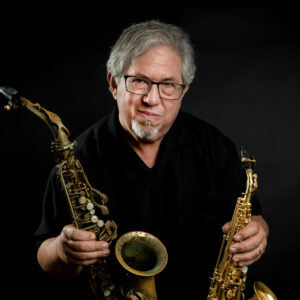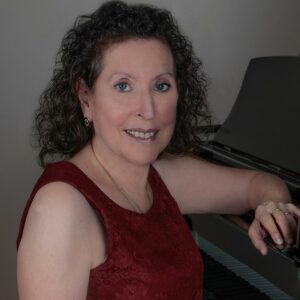Common Ground
Paul Cohen soprano & alto saxophone
Allison Brewster Franzetti piano
Brennen Sweet violin
Mira Kang cello
Maureen Hurd clarinet
Kaoru Hinata flute
Robert Aldridge composer
Allen Shawn composer
David Noon composer
Ben McPeek composer
On saxophonist Paul Cohen’s COMMON GROUND, one can embrace the unbroken musical traditions that have defined our musical selves, and in doing so, find a contemporary relevance that is both compelling and insightful. These are magnificent compositions, yet they are rarely heard. The range of expression and emotional direction is astonishing and almost visceral.
Each of the works follows a unique path; from the kaleidoscopic Ivesian treatment of American folk tunes in Hymn Variations, to the vibrant, ecstatic joy of Quartet to an Outdoor Festival, to the lush, deceptive and nostalgic Trillium Suite, and finally the introspective interlude of Terpsichord framed by outer movements of pungent rhythmic vitality.
COMMON GROUND celebrates not only the expressive inclusiveness of these diverse works, but also the common ground achieved with such varied sets of instruments. All compositions on COMMON GROUND are scored for winds, strings, and piano, and all include the saxophone. The soprano saxophone is scored in Quartet to an Outdoor Festival, Hymn Variations, and Trillium Suite, while the alto saxophone is scored in Terpsichord. In these settings, the saxophone uniquely enhances the color, texture, and dynamic resources of the ensemble, while still retaining the necessary subtlety of ensemble equality. It is common ground for composers, performers, and listeners alike.
Listen
Stream/Buy
Choose your platform
Track Listing & Credits
| # | Title | Composer | Performer | |
|---|---|---|---|---|
| 01 | Quartet For An Outdoor Festival (1989) | Robert Aldridge | Paul Cohen, soprano saxophone; Brennen Sweet, violin; Mira Kang, cello; Allison Brewster Franzetti, piano | 14:42 |
| 02 | Terpsichord (1992): Allegro grazioso | Allen Shawn | Maureen Hurd, clarinet; Paul Cohen, alto saxophone; Brennen Sweet, violin; Mira Kang, cello; Allison Brewster Franzetti, piano | 5:29 |
| 03 | Terpsichord (1992): Largo tranquillo | Allen Shawn | Maureen Hurd, clarinet; Paul Cohen, alto saxophone; Brennen Sweet, violin; Mira Kang, cello; Allison Brewster Franzetti, piano | 6:05 |
| 04 | Terpsichord (1992): Vivo | Allen Shawn | Maureen Hurd, clarinet; Paul Cohen, alto saxophone; Brennen Sweet, violin; Mira Kang, cello; Allison Brewster Franzetti, piano | 3:58 |
| 05 | Hymn Variations (1991) | David Noon | Paul Cohen, soprano saxophone; Brennen Sweet, violin; Mira Kang, cello; Allison Brewster Franzetti, piano | 11:12 |
| 06 | Trillium Suite (1979): The First Crocus | Ben McPeek | Kaoru Hinata, flute; Maureen Hurd, clarinet; Paul Cohen, soprano saxophone; Brennen Sweet, violin; Mira Kang, cello; Allison Brewster Franzetti, piano | 4:26 |
| 07 | Trillium Suite (1979): Forsythia - Harbinger of Spring | Ben McPeek | Kaoru Hinata, flute; Maureen Hurd, clarinet; Paul Cohen, soprano saxophone; Brennen Sweet, violin; Mira Kang, cello; Allison Brewster Franzetti, piano | 6:29 |
| 08 | Trillium Suite (1979): The Enigmatic Pussy-Willows | Ben McPeek | Kaoru Hinata, flute; Maureen Hurd, clarinet; Paul Cohen, soprano saxophone; Brennen Sweet, violin; Mira Kang, cello; Allison Brewster Franzetti, piano | 5:26 |
| 09 | Trillium Suite (1979): The Proudest Hibiscus - The Rose of Sharon | Ben McPeek | Kaoru Hinata, flute; Maureen Hurd, clarinet; Paul Cohen, soprano saxophone; Brennen Sweet, violin; Mira Kang, cello; Allison Brewster Franzetti, piano | 5:42 |
Recorded June 2016 at the Mason Gross recording studio, Rutgers University in New Brunswick NJ
Session Producer Paul Cohen
Session Engineer Greg Mueller
Mastering David Merrill
Executive Producer Bob Lord
A&R Director Brandon MacNeil
A&R Jeff LeRoy
VP of Production Jan Košulič
Audio Director Lucas Paquette
VP, Design & Marketing Brett Picknell
Art Director Ryan Harrison
Design Edward A. Fleming
Publicity Aidan Curran
Digital Marketing Manager Brett Iannucci
Artist Information

Paul Cohen
Paul Cohen is a sought-after saxophonist for orchestral and chamber concerts and solo recitals. He has appeared as soloist with the San Francisco Symphony, Richmond Symphony, New Jersey Symphony, Charleston Symphony, and the Philharmonia Virtuosi. His many solo orchestra performances include works by Debussy, Creston, Ibert, Glazunov, Martin, Loeffler, Husa, Dahl, Still, Villa-Lobos, Tomasi, and Cowell. He has also performed with a broad range of orchestras, including the New York Philharmonic, Metropolitan Opera (NYC), American Symphony Orchestra, Cleveland Orchestra, Santa Fe Opera, New Jersey Symphony, Oregon Symphony, San Diego Symphony, Long Island Philharmonic, Group for Contemporary Music, Greenwich Symphony, and New York Solisti.

Allison Brewster Franzetti
The 2014 and 2018 Latin Grammy® Nominee for Best Classical Album and 2008 Grammy® Nominee for Best Instrumental Soloist without Orchestra, pianist Allison Brewster Franzetti has received international acclaim from critics and audiences alike for her stunning virtuosity and musicality, both as a soloist and chamber musician. Her performances include the live Latin Grammy® Awards television broadcast, the Grammy® Awards Classical Music Tribute to Earl Wild and Lang Lang at the Walt Disney Concert Hall in Los Angeles, the American Classical Music Hall of Fame, the Robert Schumann Festival at the Marcella Sembrich Museum in Lake George NY, the Campeche Festival in Mexico, and at the opening of the VI International Festival of Music at the Teatro Colon in Buenos Aires, Argentina.
Brennen Sweet
Brennan Sweet joined the New Jersey Symphony Orchestra in 1994 as Associate Concertmaster and subsequently led the orchestra for three seasons as acting concertmaster under the baton of Zdeněk Mácal. He also led the orchestra in the widely televised concert with Andrea Bocelli at New Jersey’s Liberty State Park as well as the 9/11 memorial concert featuring Verdi’s Requiem. Sweet served for four years as concertmaster of the Brooklyn Philharmonic and appeared on the David Letterman show during his term. He has also been invited to lead other orchestras as guest concertmaster including the New York Chamber Orchestra under the direction of Gerard Swartz, Northeastern Pennsylvania Philharmonic, with whom he performed Ein Heldenleben to critical acclaim, and the Westfield Symphony among others. He has also played with the American Symphony, Bard Music Festival and the Merce Cunningham Ballet. Sweet has also performed in the Broadway productions of Crazy For You, High Society, and Candide.
Mira Kang
Soloist, chamber musician as well as strong educator, Mira Kang has been featured on many different stages. Her musical contribution includes solo featuring, chamber music, duty of principal cellist of orchestras, master classes, and workshops. She made her debut at the age of 16 as a soloist to Seoul Philharmonic Orchestra, one of the most prominent orchestras in her native country, Korea. She was also invited to perform in Seoul International Music Festival and has been featured on live radio and MBC television broadcasts in performances with Seoul Philharmonic orchestra. She has performed throughout South Korea, the Northeastern US, and Germany as a recitalist and chamber musician.
Maureen Hurd
Clarinetist Maureen Hurd Hause has appeared in concerts and masterclasses throughout Europe, Asia, and North America, performing at New York City’s Carnegie Hall, David Geffen Hall, Alice Tully Hall, and (le) poisson rouge, with the American Symphony Orchestra, the New Jersey Symphony Orchestra, the New York City Opera Orchestra, the Broadway production of The King and Iat Lincoln Center, as well as in South Korea, France, England, and Mexico. She performed at International Clarinet Association ClarinetFests® in Belgium, Italy, Japan, Canada, and the US and at the Norfolk, Skaneateles, Lancaster, and Zodiac Festivals. She has recorded for Naxos, MSR Classics and Marquis Classics. She has been recognized for her study and performances of classical works connected to Benny Goodman. She is Head of the Woodwind Program and Associate Professor of Clarinet at the Mason Gross School of the Arts, Rutgers University. She is a Selmer Paris Artist and a D’Addario Artist, playing Selmer Paris Signature and Recital clarinets and D’Addario Reserve reeds.
Kaoru Hinata
Kaoru Hinata has performed with the New York City Opera Orchestra, the New Jersey Symphony Orchestra, the Orchestra of St. Luke’s, Stamford Symphony, Glimmerglass Opera Orchestra, among many others, is a member of the New York Chamber Orchestra, and was in the Civic Orchestra of Chicago. She was the first prize winner of the Lawrence Beauregard Competition in Canada and the second prize winner in the Myrna Brown Competition in Texas and has been featured as concerto soloist with the Norfolk Festival Chamber Orchestra, the Symphony of Westchester, and the New York Choral Society Symphony. A dedicated chamber musician who has premiered works by Christopher Theofanidis, Dan Cooper, and Dan Sonenberg, she has also played for Broadway shows such as Sunset Boulevard, The King and I, and Phantom of the Opera. She holds a Master of Music degree and Artist Diploma from Yale University and a Bachelor of Music from Northwestern University. Her teachers include Ransom Wilson, Walfrid Kujala, and Keith Underwood. She is on the faculty of the Mason Gross School of the Arts at Rutgers University.
Robert Aldridge
Robert Livingston Aldridge (b. 1954) is a GRAMMY-winning composer who has written over sixty works for orchestra, opera, music-theater, voice, dance, string quartet, solo and chamber ensembles. His music has been performed throughout the United States, Europe and Japan and Australia. He has received fellowships and awards for his music including the National Academy of Recording Arts and Sciences, Guggenheim Foundation, American Academy of Arts and Letters, National Endowment for the Arts, New York Foundation for the Arts, American Symphony Orchestra League and the Geraldine R. Dodge Foundation.
Allen Shawn
Composer and pianist Allen Shawn (b. 1948), grew up in New York City and moved to Vermont in 1985 to be on the music faculty of Bennington College. His musical works include much piano music; a Symphony; Two Concertos for Piano, and two for Cello; additional concertos for Violin, and for Oboe, and a Double Concerto for Clarinet and Cello; Music for string orchestra and other large ensembles; three Chamber Operas; Choral, Vocal and Chamber Music. Recordings of his work include four devoted to his piano music, including the CD Allen Shawn-Piano Music performed by pianist, Julia Bartha, and a double CD devoted to his five piano sonatas; several devoted to his chamber music; his Piano Concerto, performed by Ursula Oppens with the Albany Symphony, conducted by David Alan Miller; works performed by Palisades Virtuosi, the Chamber Music Conference and Composers Forum of the East, and the piano duo ZOFO; and his Chamber Opera The Music Teacher, composed to a libretto by his brother, playwright and actor, Wallace Shawn. Much of Shawn’s music is published by E.C.Schirmer.
Shawn is also the author of four books: Arnold Schoenberg’s Journey; Wish I Could Be There; Twin; and Leonard Bernstein-An American Musician.
David Noon
David Noon was born of Pennsylvania Dutch, Welsh, and American Indian heritage in Johnstown, Pennsylvania, on July 23, 1946. His formal musical education began at the age of eight when he learned to play clarinet. Subsequently, he took bassoon, flute, piccolo, and piano lessons. Throughout his childhood, he frequently performed in choirs, bands, orchestras, and chamber music ensembles. During his collegiate years at Pomona College, he continued to sing and play bassoon and piano. He also began the systematic study of composition. His composition teachers have included Karl Kohn, Darius Milhaud, Charles Jones, Yehudi Wyner, Mario Davidovsky, and Wlodzimierz Kotonski. Following his undergraduate education, he attended New York University to study Medieval music with Gustave Reese. After receiving an MA in musicology at NYU, he attended Yale University, where he received an MMA and a DMA in composition.
Ben McPeek
Benjamin Dewey McPeek (August 28, 1934-January 14, 1981) was a Canadian composer, arranger, conductor, and pianist. He was born in Trail, British Columbia. In 1964 he established his own company, Ben McPeek Ltd., in which he produced and wrote music for radio and television. He quickly became the top jingle composer in Canada, and composed music of a more serious nature, including works for brass and woodwind quintet, the Paul Bunyan Suite (1977, recorded by the Canadian Brass), six piano sonatas, a piano concerto, several works for solo piano, and the orchestral works Northern 484, Fantasia, and Concert Suite among others.
Notes
Music of the late 20th century opened a new era of eclectic musical expression made possible by the rediscovery and reacceptance of tonality. New musical paths were explored that expressed contemporary and visionary ideas while embracing traditions of the past. The acceptance of a contemporary tonality — music that embraces the traditions of harmony and melody and the expansive interweaving of the two into an intelligible narrative — came into its own. Composers, seemingly liberated from academic constraints, responded by breathing new life into music reflective of their times; music no less complex than the more esoteric and intellectualized works that had begun to define the arc of modern music, but music that is far more inclusive and communicative to a wider audience. The result is a bountiful diversity of music that speaks to the soul as much as it does to the mind.
— Paul Cohen

